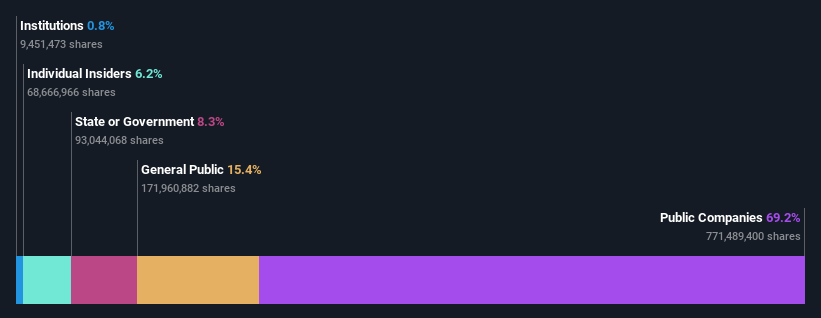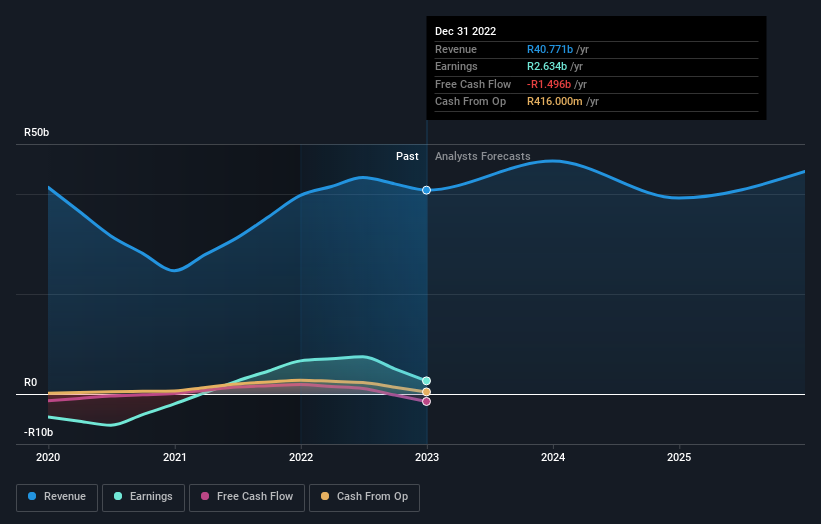ArcelorMittal South Africa Limited's (JSE:ACL) top owners are public companies with 69% stake, while 15% is held by individual investors
Key Insights
Significant control over ArcelorMittal South Africa by public companies implies that the general public has more power to influence management and governance-related decisions
The largest shareholder of the company is ArcelorMittal S.A. with a 69% stake
Using data from company's past performance alongside ownership research, one can better assess the future performance of a company
If you want to know who really controls ArcelorMittal South Africa Limited (JSE:ACL), then you'll have to look at the makeup of its share registry. We can see that public companies own the lion's share in the company with 69% ownership. That is, the group stands to benefit the most if the stock rises (or lose the most if there is a downturn).
And individual investors on the other hand have a 15% ownership in the company.
Let's delve deeper into each type of owner of ArcelorMittal South Africa, beginning with the chart below.
Check out our latest analysis for ArcelorMittal South Africa
What Does The Lack Of Institutional Ownership Tell Us About ArcelorMittal South Africa?
Small companies that are not very actively traded often lack institutional investors, but it's less common to see large companies without them.
There are many reasons why a company might not have any institutions on the share registry. It may be hard for institutions to buy large amounts of shares, if liquidity (the amount of shares traded each day) is low. If the company has not needed to raise capital, institutions might lack the opportunity to build a position. It is also possible that fund managers don't own the stock because they aren't convinced it will perform well. ArcelorMittal South Africa's earnings and revenue track record (below) may not be compelling to institutional investors -- or they simply might not have looked at the business closely.
ArcelorMittal South Africa is not owned by hedge funds. The company's largest shareholder is ArcelorMittal S.A., with ownership of 69%. This essentially means that they have extensive influence, if not outright control, over the future of the corporation. The Industrial Development Corporation of South Africa Limited is the second largest shareholder owning 8.3% of common stock, and Noluthando Gosa holds about 6.2% of the company stock. Noluthando Gosa, who is the third-largest shareholder, also happens to hold the title of Member of the Board of Directors.
While it makes sense to study institutional ownership data for a company, it also makes sense to study analyst sentiments to know which way the wind is blowing. While there is some analyst coverage, the company is probably not widely covered. So it could gain more attention, down the track.
Insider Ownership Of ArcelorMittal South Africa
The definition of an insider can differ slightly between different countries, but members of the board of directors always count. The company management answer to the board and the latter should represent the interests of shareholders. Notably, sometimes top-level managers are on the board themselves.
Most consider insider ownership a positive because it can indicate the board is well aligned with other shareholders. However, on some occasions too much power is concentrated within this group.
We can see that insiders own shares in ArcelorMittal South Africa Limited. In their own names, insiders own R251m worth of stock in the R4.1b company. This shows at least some alignment. You can click here to see if those insiders have been buying or selling.
General Public Ownership
The general public-- including retail investors -- own 15% stake in the company, and hence can't easily be ignored. This size of ownership, while considerable, may not be enough to change company policy if the decision is not in sync with other large shareholders.
Public Company Ownership
We can see that public companies hold 69% of the ArcelorMittal South Africa shares on issue. We can't be certain but it is quite possible this is a strategic stake. The businesses may be similar, or work together.
Next Steps:
It's always worth thinking about the different groups who own shares in a company. But to understand ArcelorMittal South Africa better, we need to consider many other factors. Case in point: We've spotted 2 warning signs for ArcelorMittal South Africa you should be aware of, and 1 of them is concerning.
But ultimately it is the future, not the past, that will determine how well the owners of this business will do. Therefore we think it advisable to take a look at this free report showing whether analysts are predicting a brighter future.
NB: Figures in this article are calculated using data from the last twelve months, which refer to the 12-month period ending on the last date of the month the financial statement is dated. This may not be consistent with full year annual report figures.
Have feedback on this article? Concerned about the content? Get in touch with us directly. Alternatively, email editorial-team (at) simplywallst.com.
This article by Simply Wall St is general in nature. We provide commentary based on historical data and analyst forecasts only using an unbiased methodology and our articles are not intended to be financial advice. It does not constitute a recommendation to buy or sell any stock, and does not take account of your objectives, or your financial situation. We aim to bring you long-term focused analysis driven by fundamental data. Note that our analysis may not factor in the latest price-sensitive company announcements or qualitative material. Simply Wall St has no position in any stocks mentioned.
Join A Paid User Research Session
You’ll receive a US$30 Amazon Gift card for 1 hour of your time while helping us build better investing tools for the individual investors like yourself. Sign up here

 Yahoo Finance
Yahoo Finance 

